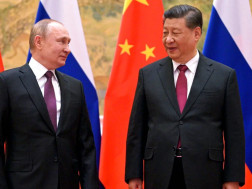Chinese exports grew 8.5% in April, showing more unexpected strength despite weakening global demand, customs data showed Tuesday.
Exports grew to $295.4 billion compared with a year earlier, although at a slower pace, building on momentum seen in the March data when exports rose 14.8%.
But imports shrank at a faster pace, with the total slumping 7.9% to $205.2 billion compared to the same time last year, according to data Tuesday from the General Administration of Customs. It was down 1.4% in March. Trade with the U.S. and European Union showed a contraction in comparison with last year.
China’s trade surplus in April widened, growing 82.3% compared to the same period last year.
In the first four months of the year, exports edged up 2.5% over the same period of 2022 to $1.12 trillion, the General Administration of Customs of China reported. Total imports contracted 7.3% to $822 billion.
Despite that, forecasters say exports should weaken this year.
Global consumer demand weakened after the Federal Reserve and central banks in Europe and Asia raised interest rates to cool inflation that was near multi-decade highs by reining in business and consumer activity.
Chinese manufacturers say new orders and export orders declined in April from the previous month, according to a survey by the national statistics bureau and the Chinese Federation for Logistics & Purchasing.
The government set this year’s official economic growth target at “around 5%,” up from last year’s 3% expansion, which was the second-weakest since the 1970s. Some economists raised their growth forecasts to closer to 6% following March’s unexpectedly strong trade figures.
Trade also has been dampened by tension with Washington and restrictions on access to U.S. processor chips and other technology in a feud with Beijing over security and Chinese industrial policy. Chinese factories assemble most of the world’s smartphones and other electronics.
Exports to the U.S. were down 6.5% to $43 billion compared with the same period last year, and imports also fell 2.9% to $13.3 billion in April. China’s trade surplus shrank 7% down to $29.7 billion.
Trade with Europe also contracted. Exports to the European Union were down 17.7% in April compared to the same time last year, to $44.7 billion. Imports also contracted, shrinking 38.6% to $23.4 billion. Meanwhile, China’s trade surplus with the EU grew 31.5% to $21.3 billion.
Chinese imports from Asian producers of chips and other electronic components are weakening, according to Simon Knapp of Oxford Economics. Knapp noted South Korea’s exports to China plunged nearly 30% in the first quarter of 2023 from a year earlier, while South Korean exports to the rest of world were off by only 7%.
“Firms in the region are responding to the poor state of U.S.-China relations,” Knapp said in an April 24 report. “Chinese firms are likely to be adjusting their purchasing strategies in response to these tensions and the priorities of their own government.”
Meanwhile, China’s trade with Russia showed further positive growth. Exports to Russia were triple what they were in April last year, to $9.6 billion, and imports were up 7% to $9.6 billion. China has essentially eliminated its trade deficit with Russia, with a 99% shrink of the $5.1 billion deficit in Russia’s favor last year.
On April 23, the government announced steps to support struggling exporters, including making more trade finance available and encouraging cross-border e-commerce.
A five-month campaign launched April 29 was meant to increase trade by improving logistics and cutting costs for exporters in 17 cities, including Beijing and Shanghai.
The ruling Communist Party’s Politburo promised at an April 28 meeting to promote economic recovery and “expand demand” at home, which could shore up imports of oil, food and consumer goods, AP reports.
















